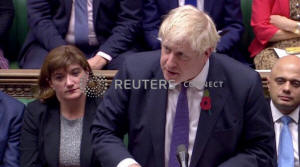Brexit election? Johnson makes fresh bid to break the deadlock
 Send a link to a friend
Send a link to a friend
[October 29, 2019]
By Kylie MacLellan and Michael Holden
LONDON (Reuters) - Prime Minister Boris
Johnson makes a fresh bid for a December election to break the Brexit
deadlock on Tuesday after nearly three-and-a-half years of wrangling in
parliament that has left Britain's exit from the European Union in
turmoil.
As the European Union finalizes a third delay to the divorce that was
originally supposed to take place on March 29, the United Kingdom, its
parliament and its voters remain divided on how or indeed if to go ahead
with Brexit.
Johnson, who had promised to deliver Brexit on Oct. 31, "do or die", has
repeatedly demanded an election to end what he casts as a nightmare
paralysis that is sapping public trust by preventing any Brexit outcome
at all.
After parliament refused Johnson his third demand for an election on
Monday, he will try to force a bill through parliament on Tuesday that
calls for a Dec. 12 election. It needs a simple majority in parliament.
"We will not allow this paralysis to continue and, one way or another,
we must proceed straight to an election," Johnson told parliament on
Monday. "This House cannot any longer keep this country hostage."
Meanwhile, the legislation enacting Johnson's Brexit deal has been put
on hold, pending an election, Jacob Rees-Mogg, who oversees the
government's legislative agenda in the House of Commons, said.
The first Christmas election in Britain since 1923 would be highly
unpredictable: Brexit has variously fatigued and enraged swathes of
voters while eroding traditional loyalties to the two major parties,
Conservative and Labour.
Ultimately, voters would have a choice between an emboldened Johnson
pushing for his Brexit deal or a socialist government under Jeremy
Corbyn renegotiating the deal before a referendum.
If no party wins conclusively, the Brexit deadlock will continue.
CHRISTMAS ELECTION?
While almost all British politicians agree that an election is needed,
Johnson's opponents want to inflict maximum political damage by
preventing his last-minute deal from being ratified before the poll.
[to top of second column]
|

Britain's Prime Minister Boris Johnson speaks at the House of
Commons in London, Britain, October 28, 2019, in this screen grab
taken from video. Parliament TV via REUTERS

Johnson, in turn, is trying to shift the blame for failing to
deliver Brexit by Oct. 31 on to parliament.
Such is the lack of trust in parliament that lawmakers are
squabbling about almost everything from the sequencing of Brexit to
the date of the election.
Behind the bickering, though, Johnson is closer to an election than
he has ever been in his tumultuous 3-month premiership.
Two opposition parties, the Liberal Democrats and Scottish National
Party, want an election on Dec. 9.
"We won't accept any jiggery-pokery from the prime minister," Ian
Blackford, the Scottish National Party's Westminster leader, said.
"Our vote certainly can't be taken for granted."
The BBC cited unidentified sources in Johnson's office as saying
that the government would agree to an amendment put forward by
opposition parties to hold an election on Dec. 11.
Johnson's Conservatives are ahead of Labour by an average of about
10 percentage points in polls this month, though pollsters
underestimated the support for Brexit in 2016 and admit that the
models they use are wilting beside the Brexit furnace.
When Johnson's predecessor, Theresa May, bet on a snap election in
2017, she lost her slender majority - a failure that ultimately
prevented her from ratifying her Brexit deal and so sank her
political career.
In the June 23, 2016 referendum, 17.4 million voters, or 51.9
percent, backed leaving the EU while 16.1 million, or 48.1 percent,
voted to remain.
(Additional reporting by Paul Sandle and Elizabeth Piper; Writing by
Guy Faulconbridge; Editing by Michael Holden and Giles Elgood)
[© 2019 Thomson Reuters. All rights
reserved.]
Copyright 2019 Reuters. All rights reserved. This material may not be published,
broadcast, rewritten or redistributed.
Thompson Reuters is solely responsible for this content. |